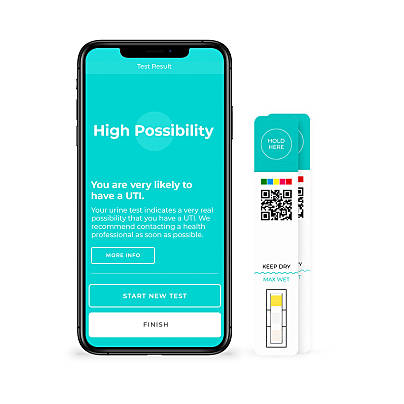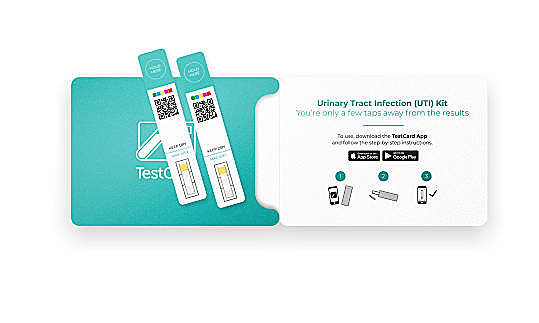What is interstitial cystitis?

Medically reviewed by
Dr Babak AshrafiLast reviewed: 16 Feb 2022
Interstitial cystitis (IC) is long term inflammation of the bladder. It usually results in chronic pelvic pain and a frequent urge to pee. It is not caused by an infection so antibiotics will not help.

On the other hand, regular cystitis is usually caused by a type of urinary tract infection (UTI) that causes the bladder lining to become irritated and inflamed. It usually gets better after a few days but some people might need antibiotics like nitrofurantoin.
Interstitial cystitis is also known as bladder pain syndrome or chronic cystitis. It’s more common if you are aged over 30, and it can affect your quality of life.
Your symptoms can be managed with lifestyle changes and interstitial cystitis treatment options.
What are the symptoms of interstitial cystitis?
The symptoms of interstitial cystitis can vary from person to person.
You may notice that some symptoms are more likely to happen when you feel like you need to pee, but you hold it in. Being on your period can also lead to more symptoms of interstitial cystitis. If you exercise regularly this can be a trigger too. For some people, stress and anxiety can be a major factor.
Let’s explore some of the most common symptoms of interstitial cystitis. These include:
- chronic pelvic pain
- lower back pain
- pain in your lower abdomen (stomach) when your bladder is full
- pain which feels better after you pee
- the sudden urge to pee
- frequent peeing
- pain during sexual intercourse
If you feel that your symptoms are not getting better or are worse than usual, you should speak to a doctor or pharmacist about them. It’s better to get help with your symptoms as soon as you can.
There are treatment options you can try to manage your symptoms, like painkillers.
You may want to consider seeing a therapist if your mental health is being impacted by the symptoms.
What causes interstitial cystitis?
The causes of interstitial cystitis, or painful bladder syndrome, are still not clear. Recent studies and clinical trials can help us understand why it might happen. Here are some of the possible causes:
- damage to the tissues that line the inside of your bladder which cause toxins to leak into other areas
- your immune system attacking your bladder by mistake
- an allergic reaction to the pee that is in your bladder
- an issue with the pelvic floor muscles that surround your bladder

No results found.
Please check your spelling or try another treatment name.
How is interstitial cystitis diagnosed?
Interstitial cystitis is diagnosed by a doctor who will be able to confirm whether you have it or not. They can give you treatment options that can help with your symptoms too.
Your doctor might do the following to diagnose you with interstitial cystitis:
- review your general medical history including current medication and pre existing conditions
- discuss your symptoms including how bad the pain is and how often you need to pee
- ask about your current eating habits and how much alcohol you drink
- examine the nerves around your lower abdomen and genital areas including your anus and rectum
- request a urine test - this is to rule out any bacterial infections
- refer you for a cystoscopy - where a thin tube with a camera is passed through your urethra to check for growths, tumours (such as potential bladder cancer), or stones
Things you can to do help interstitial cystitis
Interstitial cystitis symptoms can be managed and there are some things you can do to help. You may want to consider a combination of lifestyle changes, supportive therapies and treatments.
Lifestyle changes
Some lifestyle changes that can improve interstitial cystitis symptoms include:
- planning to take regular breaks to empty your bladder
- taking part in stress-reducing activities like meditation
- trying pelvic floor exercises to strengthen the muscles around your bladder
- taking regular warm baths to soothe the pain
- stopping smoking
- reducing how much water you drink just before bed
- avoiding acidic foods such as citrus fruits and alcoholic drinks
Medication
Your doctor may recommend medication to help treat symptoms of interstitial cystitis, for example:
- painkillers you can access from a pharmacy over the counter, such as paracetamol
- stronger painkillers available on prescription like amitriptyline, gabapentin or pregabalin
- antihistamines, such as loratadine, cetirizine or cimetidine
- medicines that help relax your bladder muscles, such as tolterodine, solifenacin or mirabegron
- medicines to help repair the lining of your bladder, such as pentosan polysulfate sodium (elmiron)
Supportive therapies
The following supportive therapies are thought to be helpful with relieving interstitial cystitis symptoms:
- physical therapy, where a physiotherapist will massage the pelvic floor muscles below your stomach area
- bladder training, to help you learn to hold more pee in your bladder before needing to go to the toilet
- psychological therapy, to help you talk about your symptoms and their impact on your daily life, and support your mental health
- transcutaneous electrical nerve stimulation (TENS) machine, which sends signals to nerves to reduce pain
- sacral nerve stimulation, as your sacral nerves are the major link between the spinal cord and nerves in your bladder wall which tell you to pee
Surgery
Some surgical procedures may be carried out if you have clear abnormal areas (lesions) in your bladder, or other treatments do not work. These may include:
- cauterisation – where ulcers (wounds) inside the bladder are sealed using a laser
- bladder instillation – regular bladder filling with a liquid medicine via a catheter
- botulinum toxin injections – to relax the bladder wall
- neuromodulation – an implant that stimulates your nerves with electricity
- augmentation – to increase the bladder capacity and size
When to speak to a doctor
You should speak to the doctor for a checkup if you think you might have interstitial cystitis. Try to do this as soon as you can to prevent symptoms from developing further or becoming worse.
Painful bladder syndrome has a number of different symptoms. The most common one is chronic pelvic pain in your lower abdomen (stomach) area. Look out for changes to your normal peeing routine too.
Your doctor may ask you some questions about your symptoms and examine you closely. You may be referred to a urology specialist (urologist) for further investigation and treatment. For example, they may do a biopsy, where a small sample of tissue is taken and looked at under a microscope. Then they will look at what may be the cause of interstitial cystitis and recommend a treatment.

Dr Babak Ashrafi Clinical Lead for Service Expansion
Accreditations: BSc, MBBS, MRCGP (2008)
Babak studied medicine at King’s College London and graduated in 2003, having also gained a bachelor’s degree in Physiology during his time there. He completed his general practice (GP) training in East London, where he worked for a number of years as a partner at a large inner-city GP practice. He completed the Royal College of GPs membership exam in 2007.
Meet our doctorsLast reviewed: 16 Feb 2022
-
Bladder pain syndrome (interstitial cystitis), National Health Service [accessed February 2023]
-
Management of Bladder Pain Syndrome (BPS): A Practical Guide, Advances in Urology [accessed February 2023]
-
Interstitial Cystitis/Painful Bladder Syndrome, Patient [accessed February 2023]
-
Painful bladder syndrome (PBS) and Interstitial Cystitis (IC), London Urology Specialists [accessed February 2023]
Cystitis bladder infections are caused by bacteria and need to be treated with antibiotics. ZAVA offers a variety of treatment through a convenient, discreet service.











